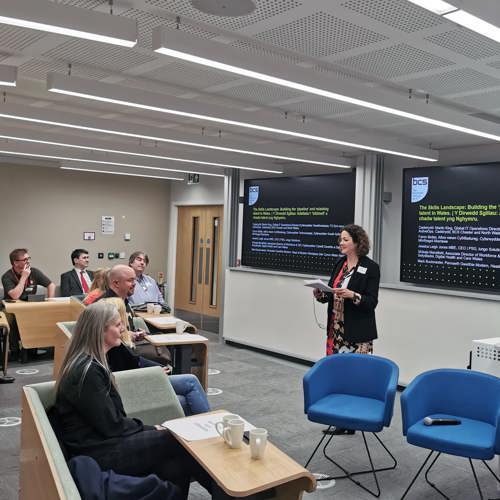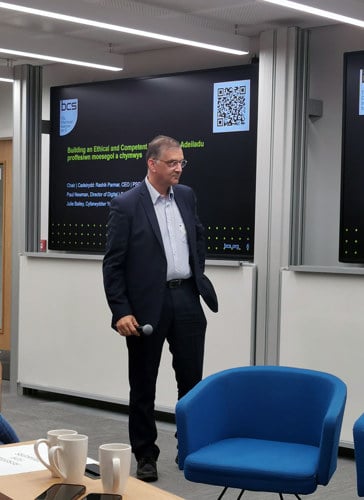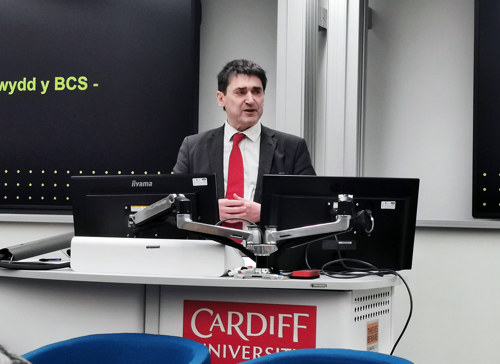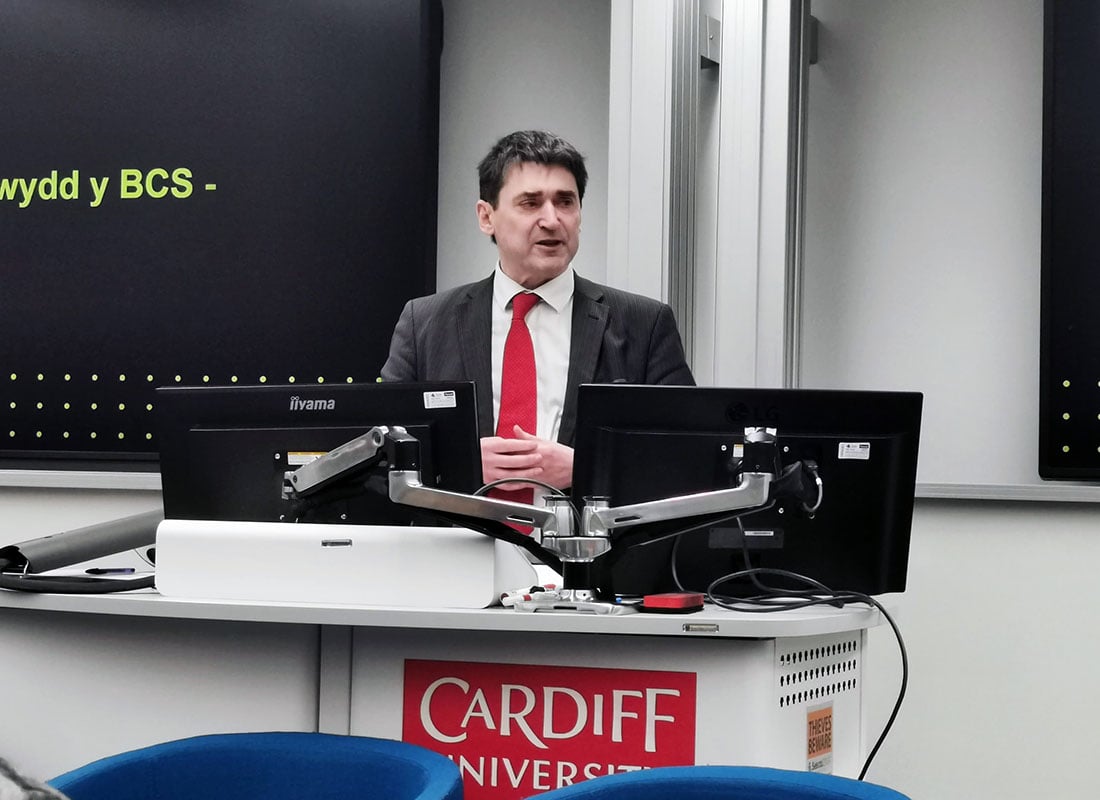By drawing on BCS’ role as a convener, the first BCS Hub will bring professionals, industry and academia together to make IT good for society in Wales. More BCS hubs will follow.
The new BCS Hub collaboration initiative is designed to help people, academia and businesses get the most out of IT. The first Hub was launched in Cardiff and will focus on Wales, Welsh businesses and people who live in Wales.
Speaking to a large, invited audience in Cardiff University’s Abacws building, BCS Managing Director — Institute, Holly Porter said: ‘I’m immensely proud to be speaking to you tonight. The BCS Wales Hub is all about collaboration and collaborating around some important aims and objectives. Helping people to access a rewarding career. Supporting and creating a culture of ethical and competent professionals and exchanging knowledge between industry and academia.’

The Hub programme seeks to deepen understanding of the social, economic and skills based challenges unique to different geographic regions. Then, through BCS’ convening power, Hubs will bring together businesses, experts, professionals and academia to help address these opportunities.
Summing up the challenge and taking a view on the future, BCS CEO, Rashik Parmar, said: ‘The phrase I want you all to think about is “be digital or be digitised”. Digital is coming to replace large aspects of society. It’s up to us to define what work is… to be much more inclusive, to be more meaningful and to solve some of humanity’s systemic issues. Climate change is an existential threat that digital can play a big part in addressing.
‘Through BCS and through the Hub, we can understand what the issues are here [in Wales] and we can all come together to make this a better place — a place where digital really is good for society.’

Speaking about IT’s centrality in society and its importance, Director of Corporate Engagement, Julie Bailey, said: ‘We’ve got an industry of specialist skills and we’ve got an industry that constantly evolves and reshapes, but we don’t have a recognised profession. This industry needs to be recognised as a profession — it’s what the industry deserves.’
All roads lead to Wales
Wales was chosen as the seat of the first BCS Hub because through its member groups, BCS has been active in the country since its very earliest days. BCS was founded in 1957, and the BCS Cardiff Branch was born a year later. The Cardiff branch eventually became the South Wales Branch and continues to play a big part in supporting professionals and inspiring the next generation.
The BCS Mid-Wales branch is primarily based at the University of Aberystwyth. The group holds regular talks hosted by expert speakers and supports students studying computer science at the university.
Wales is also served by the BCS Chester and North Wales branch, which actively supports members with talks on cryptocurrency, agile, software development and quantum computing.
Holly said: ‘The BCS in Wales committee was set up from the South Wales branch and it was active for a few years. It's that legacy that we're looking to pick up today with the creation of the first BCS Hub.’
Grand scale challenges and jigsaws
Along with looking to address challenges and opportunities unique to Wales and the Welsh economy, the first BCS Hub is launched at a time of challenge and opportunity for the IT industry itself.
Firstly, the Hub’s launch coincided with the Post Office Horizon IT Inquiry beginning its third phase of testimony. The Inquiry casts a shadow over the IT industry.
Elsewhere, artificial intelligence (AI) presents the industry with potentially enormous opportunities for innovation and routes to economic growth. Along with benefits, AI also presents IT practitioners and policymakers with significant ethical and regulatory challenges surrounding inclusion, equity, and fairness.

Speaking to the audience about the Horizon scandal and AI, BCS President, Alastair Revell, explained how although they are seemingly unrelated, helping AI grow up responsibly and addressing the IT industry’s role in the Post Office scandal are both arenas where professionalism, chartered professional status and ethics could — and should — play significant roles in protecting the public. Failure to do so, he stated, risks seeing the public withdraw its trust in AI and potentially in IT itself.
Alastair said, echoing and adding to Holly’s sentiments: ‘For us here, tonight, this is a huge opportunity. It’s an opportunity for us to come together over the coming months, and potentially years, to make a huge step-change in how we tackle the big issues facing the tech profession here in Wales.’
The BCS Hub concept, Alastair stated, has the potential to make a massive difference in how, as a profession and professional body, we support the tech sector moving forward in Wales.
‘The BCS Wales Hub will serve as a model for us to use across the country as we roll the concept out’, he said. ‘But it's all starting here. The important thing about tonight is coming together to collaborate — and to collaborate for the public benefit.’
In summary, he stated, ‘We know BCS cannot do this alone, but everyone in the room has a piece of the jigsaw. By working together to put our jigsaw pieces together, we can build a picture of a joined-up IT profession in Wales and then collaborate to realise that vision. We feel obligated to do that because we are the Chartered Institute for IT, and we are charged with making IT good for society.’
Academic collaboration
A key focus for the hub is fostering close collaboration between industry and academia. Speakers called for this relationship to be mutual and bi-directional. For example, computer science degrees are often brilliant at giving students knowledge about their subject. Indeed, this is important to employers but, they also require people with workplace skills like collaboration.
For this reason, Cardiff University has invested heavily in forming close relationships with businesses and arranging for students to do placements and live projects with those organisations.
The Hub, it’s hoped, will help Cardiff and other Welsh Universities forge closer relationships with industry.
Attendees also heard about Technocamps, a programme to support digital upskilling across Wales through strong links with universities.
The group aims to increase young people’s engagement with STEM subjects. It works with secondary schools through STEM enrichment programmes and primary schools through the Playground Computing programme. It also provides training and professional development for teachers to prepare them for the challenges of delivering in a technical and dynamic environment.
The programmes are free to the recipient and fully funded by the Welsh Government.
For you
Be part of something bigger, join BCS, The Chartered Institute for IT.
Digital inclusion
A talk between Jocelle Lovell, Director of Inclusive Communities at Cwmpas, and BCS’ Holly Porter illustrates the importance of creating and building digital inclusion.
Cwmpas is a development agency that works to bring about positive change in Wales and the UK. It is a cooperative that focuses on building a fairer, greener economy and a more equal society where people and the planet come first. The organisation was established over 40 years ago.
Cwmpas’ role is to support the agencies and programmes that support people in the community — supporting the supporters. One programme, she explained, focuses on people in Wales who are digitally excluded.
She explained that around 170,000 people may lack the skills, confidence, or motivation to use digital technology. Generally, people from the most vulnerable communities are overrepresented in this number.
In many ways, COVID-19 worsened the problem of digital exclusion because, as the virus swept the country, it kickstarted a wave of digital transformation in crucial support services like hospitals and GP surgeries. Suddenly, video appointments moved from low on clinical CIOs' project lists to urgent.
Though a credit to NHS IT teams’ work during COVID-19, digitalising primary and secondary healthcare means the already digitally excluded might find it challenging to access services via phones and tablets. In many ways, those who need help from health and social care services the most might be the ones who find accessing support digitally the hardest.
Notably, the assembled guests heard that digital inclusion is different from accessibility. Accessibility is about designing and engineering digital products that remove potential barriers to interaction, while inclusion is about giving people the confidence and motivation to interact.
Consulting and including people at the design stage, Jocelle said, is critical to helping people feel more confident in using digital products.
She explained that ethical thinking is also critically important. If young people become acquainted with ethics right when they are introduced to computing and coding, thinking about accessibility and inclusion will become natural.
Diversifying the talent pipeline
Elsewhere, attendees heard about how, in Wales, there is a focus on reshaping perceptions about IT careers and making digital pathways more accessible.
Rather than traditional computing clubs, educators advocate for integrating digital concepts into subjects like biology to illustrate the relevance of digital skills across various fields. Embracing this more creative ‘subject first, computers second’ approach, they aim to demystify technology and boost confidence, especially among the underrepresented.
With a limited talent pool and the challenge of talent leaving Wales, personalised learning and inclusive environments are crucial for attracting and retaining talent.
Micro-credentials and apprenticeships are vital strategies to address the skills gap and advance career pathways.
Jessica Leigh Jones MBE, CEO at iungo Solutions, a specialist in flexible and hybrid learning pathways that help people take either a first step into tech or the next step in their career, also talked about the need for upskilling and reskilling. Jessica explained that while degree based pathways work for some people, others benefit more from focused, on demand ‘short sharp’ development opportunities.
Ultimately, the goal is to unlock individual potential by bridging employers with communities and recognising that every company is now digital.
In summary, digital transformation is the key to unlocking great opportunities in Wales. The opportunity is huge, as is the challenge.
Understanding the existing talent pipeline and enabling educators and businesses to collaborate on building pathways, qualifications and upskilling support is key. We must also ensure that professionalism and ethics are at the heart of the talent pipeline.

















